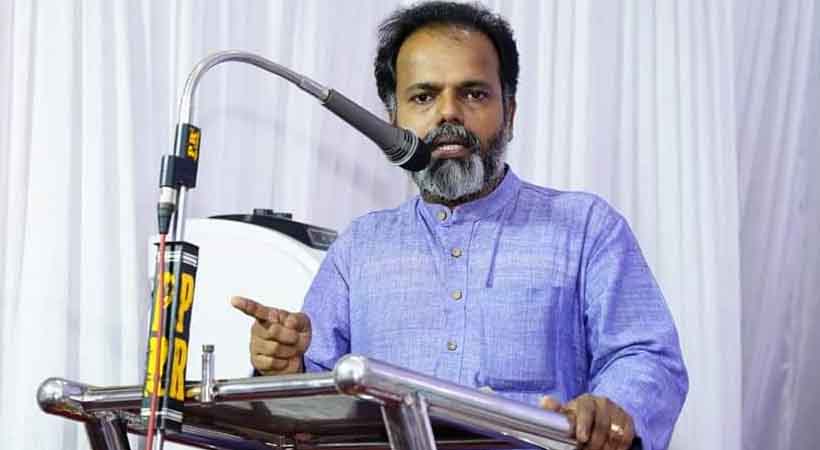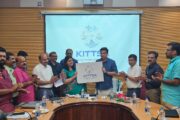Not even half of the industry partners have associated with Responsible Tourism Mission, says Rupesh Kumar

The tourism industry of Kerala is largely supportive yet not even 50% of the industry partners are associating with the Responsible Tourism (RT) Mission activities, says Rupesh Kumar, the State’s Responsible Tourism Mission Coordinator. We hope by implementing the RT Classification system, industry partners will automatically cooperate with the Mission since RT Classification is a promotional tool in the international tourism market. Our activities have created a new face for Kerala Tourism in the national and international tourism market and RT has become a kind of tagline for Kerala Tourism, he says. Excerpts from an interview:
Q: In what way has the RT Mission helped in the development of Kerala Tourism?
The Kerala Government initiated Responsible Tourism (RT) activities during 2008 on an experimental basis to resolve the concerns, agitations and conflicts between the local community and tourism industry at different destinations in the state. Those agitations were not against tourism, it was against the unethical practices of tourism and the negative impacts of it and the difficulties faced by the local community.
The definition of RT also shows the prominence of the local community. As per the Cape Town Declaration of Responsible Tourism, Responsible Tourism is about “making better places for people to live in and better places for people to visit”. The first part of the definition says that creating better places for people to live in and then comes the people who visit the place. That itself shows the importance of the local community of a destination.
Even though Kerala started implementing the field level implementation of RT in 2008, its activities became widespread after the formation of RT Mission in 2017 June. RT Mission’s activities enhanced the involvement and participation of the local community in tourism at their destination, through economic, socio-cultural, and environmental-related activities of the Mission. It created a healthy give and take relationship with the tourism industry and the local community. It has also developed new destinations and products through various projects of RT Mission.
Unique experiential packages under various segments like cultural experience packages, village life experience packages, festival packages, cuisine experience packages, native experience packages, carbon-neutral packages etc were developed by the RT Mission and they are operational. These packages are new products for the industry to sell and many are associated with RT Mission in this venture.
Our activities have created a new face for Kerala Tourism in the national and international tourism market and RT has become a kind of tagline for Kerala Tourism.
Q: What were some of the challenges that the RT Mission faced, since 2017, when it was established?
The major challenges faced by RT Mission are largely around lack of proper awareness and understanding about the RT concept among community, industry, and local self-governments (LSGs). Responsible tourism is a concept that has 3 basic responsibilities – economic, socio-cultural, and environmental. All three have equal importance. Here we see that people/industry practice one or two elements under any of the three responsibilities and claim that they are RT practitioners. For example, if a property buys milk, vegetables, poultry, etc. from the nearby houses they are following the RT concept in one way. But if they are dumping their waste into the public place or their sewage system is connected to a local water body they are acting against the RT concept. Then how can we call them a RT practitioner? Many issues are there like this.
The tourism industry of Kerala is very supportive yet not even 50% of the industry partners are associating with the Mission activities. We hope by implementing the RT Classification system automatically industry partners will join with Mission since RT Classification is a promotional tool in the international tourism market.
Even though the theory or the definition is based on three basic concepts the elements in the implementation will be different for different destinations. The success of RT depends upon various factors like LSG support, the mentality of the community, geographical specifications and so on. Hence a successful model of an RT destination cannot be exactly replicated in another place. Each place should have unique RT practices according to their geographical, demographical, social and cultural set up. LSGs have a significant role in tourism development and RT. Even though RT Mission has some success stories of LSG association for tourism developments, major share of the LSGs are not concerned or bothered about it. Without strong LSG and industry support RT cannot be implemented successfully. Wherever RT Mission, LSGs, industry jell together for RT implementation success models have emerged.

Q: What do you think have been the major achievements of the Mission in the last three years?
I can share some specific and tangible result on this matter. They are listed as below –
· Number of RT units increased from 197 during 2008-2017 to 18000 within 3 years (July 2017 –July 2020)
· The number of direct beneficiaries increased from 843(during 2008-2017) to 32549 (during July 2017 –July 2020)
· Indirect beneficiaries have increased from 2529 to 60373
· The income generated by local community from tourism also has increased from Rs 12cr (during 2008-2017) to Rs 32cr (during August 2017- March 2020)
· RT Mission activities created a new face to Kerala Tourism in the national and international tourism platform
· Wide variety of Tourism Products
· 75000 new tourists in 2 years
· Various LSGs in Kerala are connected with tourism
· Enhanced local employment & local procurement in tourism
· Community-industry harmony
· Women empowerment through tourism
· Well defined system for the implementation of RT activities has been derived through practice
· Became world model for responsible tourism practices
· Started guiding other states for RT implementation.
Awards & recognitions
International awards
1. World Travel Mart Responsible Tourism Awards-2017
Category: WTM Highly Commended Award
Recipient: Kumarakom Responsible Tourism Project, RT Mission
2. World Travel Mart Awards-2018
Category: Best in Responsible Tourism
Recipient: Kerala Tourism, Responsible Tourism Mission
3. World Travel Mart Awards-2018
Category: Best for Managing Success category Gold Award
Recipient: Kumarakom Responsible Tourism Project, RT Mission
4. PATA Awards 2019
Category: Women Empowerment in Tourism Sector- Gold Award
Recipient: Responsible Tourism Women Empowerment Activities at Kumarakom
Q: What has been its contribution towards development of village communities and eradication of poverty in local circles?
At present RT Mission has 18000 registered units and most of them are owned/led by grass root level community members. These units’ products and services are linked with the tourism industry and they are generating additional income through that. RT Mission units do not require large investments to earn money from tourism, they can continue practicing their normal livelihood activities like fishing/farming/ weaving and use existing facilities like one room for home stay/farm for farm visit/pottery making and talents in art forms etc to generate additional from tourism. RT mission is acting as a facilitator between the units and industry to link them with each other.
Through the activities of RT Mission many local and traditional art forms, artists, craftsmen have been linked with tourism and they are earning 100% more than what they earned before. The fishing units linked with RT mission are earning additional income by showcasing the fishing methods to tourism while they are doing their normal livelihood activities. In the same way coir making units, weaving units etc. also earn from the experiential tour packages of RT Mission.
These activities also protect and rejuvenate the traditional art, culture, folk lore, local cuisine etc. and preserve them for the next generations.

Q: What has been your role in women empowerment in tourism?
Around 73% of the RT Mission units are women owned or managed that creates women empowerment through tourism. Through RT Mission activities the women folk of the local community got a chance to earn from tourism by utilising their free time, talents, skills etc. As we know women empowerment can create magic in community development.
Q: Traditional artisans have been largely ignored by the travel and tourism sector. How do you think we can take care of such marginalised people?
RT Mission is already into the process of linking the traditional artisans with tourism. The experiential tourism packages give an opportunity for the tourists to experience the traditional methods practiced by artisans. Each experiential package has at least one activity of this kind. The guest will get an opportunity to purchase products directly from the place of manufacturing. In addition to that the online network of RT Mission ‘Kerala RT Network’ gives an opportunity for the artisans to exhibit and sell their products directly to customers without any commission. Some of the industry partners also have joined hands with RT Mission to support the traditional artisans and craft makers by providing a display space/ outlet for RT Mission units’ products.
Q: What about environmental equilibrium? Can you explain how the Mission has ensured ecological protection?
RT Mission is doing various environmental protection activities in association with industry partners and various other organisations working in this field. As part of Clean Kerala Initiative, our association with the KTM society has led to plastic free declaration of various accommodation units across the state. Through this initiative 1000 industry partners have declared themselves as plastic free by removing 18-21 plastic items from their property.
In association with various NGOs and other interested agencies RT Mission is promoting Miyawaki afforestation, protection of local species of trees, protection of mangrove forests etc. To avoid plastic carry bags and promote the use of cloth/paper bags RT Mission has distributed 50,000 cloth bags to units of RT Mission and industry partners who are associating with the Mission.
RT classification for industry partners have already started implementation of various steps to gain prominence for ecological protection and environmental support activities. RT Mission is also in the process of destination-specific RT protocol development for destinations, with more weightage given for environmental protection.







